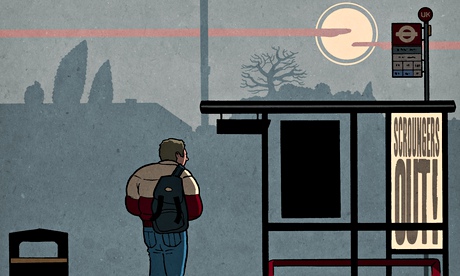With the black stuff cheaper than it has been in years, Europe’s governments must invest in their infrastructure

For the past 18 months, the world’s biggest oil producer has been the US. Saudi Arabia, eat your heart out. Courtesy of the fracking revolution, the US will maintain this new standing for the foreseeable future, according to official projections.
The world as we’ve known it for the past 50 years is being stood on its head. Which provides cause for optimism. But an international landscape increasingly dominated by nationalist firebrands, conservative zealots and policy makers in thrall to austerity economics is always apt to waste opportunities.
One first good result of this oil price shift, however, was witnessed at Opec’s meeting in Vienna last week. The once feared cartel of oil-exporting countries, with Saudi Arabia at its core, a cartel that at one time commanded more than half of global production, is now a shadow of its former self. Opec’s members were unable to agree to cut production because most are strapped for cash and had no choice but to maintain levels.
With the US needing to buy less oil on international markets and China’s growth sinking to its lowest mark for 40 years, there is now, amazingly, the prospect of an oil glut. The oil price instantly nosedived to its lowest level for four years, around $70 a barrel – down more than a third in three months. On Friday, there was mayhem in the markets as investors reassessed the sober prospects for oil companies, and banks suddenly realised that they were exposed to a new round of write-offs to distressed energy companies and even to governments. But although particular companies may lose out, the first-round effect of this fall should provide good news. High oil prices depress economic activity. They suck money from consumer spending and redirect it to oil-exporting countries, which typically hoard it in elephantine foreign exchange reserves or unspent bank deposits. It is a tax by the few on the many.
It should be no surprise, then, that in the past rising oil prices were associated with recessions and falling oil prices with booms. If the oil price carries on falling back towards $50 a barrel, and if history is any guide, the western economy should respond – to the good. Already, petrol prices are below 120p a litre, with supermarkets announcing another 2p off.
The European economy, in particular, dependent on oil imports, is an obvious and immediate potential beneficiary. Suddenly, the balance of economic advantage with Russia, no less dependent on oil and gas exports, will flip. Russia’s 2014 budget was based on an oil price of $100 a barrel. At $70 a barrel, the economy will contract by at least 3% in 2015, the country will run a balance of payments deficit and the government’s finances will spin out of control.
The doubts about Putin’s foreign policy within the Russian financial, political, security and business establishment will surely increase: his hold on power is becoming less secure. The chances of Russia sustaining a surrogate war in Ukraine have suddenly been reduced. All good news.
But western governments cannot hope that economic benefits will arrive automatically. These are new times. It has been obvious since the 2008 financial crisis that the economic landscape is wholly different. Digitisation is gnawing away at established companies’ business models and empowering new insurgents at an escalating pace. And this is happening in a world in which there is a massive overhang of private debt and where banks are still nursing damaged balance sheets.
Uncertainty and fear abound. Interest rates in Britain alone have been pegged at 0.5% for more than five years. But still business is reluctant to invest, not knowing what technologies to back or not knowing how much demand there will be for new products and services. We live in an era of stagnation, “secular stagnation”, as former US treasury secretary Larry Summers has described it.
So falling oil prices offer the world economy a great opportunity. But if it is not leapt upon purposefully by aggressively expansionary economic policy, secular stagnation might worsen. Because energy prices affect all goods and services, their fall could reinforce the trend for the general price level to fall further and so accelerate deflation and all the ills that go with it.
This is the moment for the EU and the European Central Bank to throw down the gauntlet to Germany. Last week, the European Commission launched a plan with at least an eye-catching top line – to trigger an additional ¤300bn spending on vital infrastructure across the continent. Except it was a phantom ¤300bn, with Germany insistent that it should involve no extra spending by the commission, nor by governments, nor extra borrowing by the European Investment Bank. Why? Because there was an alleged risk of inflation.
However, with oil prices falling by a third in a few months, the risk is non-existent. Rather, the problem is of the opposite order: not seizing the moment to launch a genuine economic stimulus of some scale.
The world needs to be no less purposeful about how Middle Eastern politics will now play out. US engagement in the region has been driven by the need to secure its oil supplies: as it becomes an oil exporter, that need is removed. The US has played its role as global policeman unevenly and often counterproductively. But at least it has played it, acting as some constraint on Israel, mindful that war will damage the flow of oil to the US.
An isolationist, disengaged US would be much more worrying. Into the vacuum would step a new array of nationalists, terrorists and religious fundamentalists. China will become the new great power in the Middle East, involving itself in a region with now declining oil revenues, intensifying rivalries and endemic religious enmities.
Ukip and the Tory Eurosceptic right complacently invite Britain to deal with the world as it once was, in an imagined utopian past. No need to counter stagnation either as a country or together with others; we British can act alone in a world where economic growth is certain. No need to marshal what remains of British power together with others to create international architecture that forces common responses to common problems. The world is safe and everybody is our potential trading partner. An oil price that falls a third in a few months is a reminder of just how perilous our new world is – and how vital it is to have friends.






